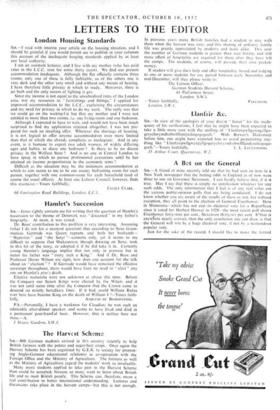Hamlet's Succession
SIR.—Janus rightly corrects me for writing that the question of Hamlet's succession to the throne of Denmark was " discussed " in my father's biography. At most, it was raised. Dr. Boas' contribution to this problem is very interesting. Assuming (what I do not for a moment question) that according to Saxo Gram- maticus Gertrude was Queen regnant, and both her husbands- " Hyperion " and " the Satyr "—consorts only, yet it seems to me difficult to suppose that Shakespeare, though drawing on Saxo, took in this bit of the story, or adopted it if he did take it in. Certainly young Hamlet's language implies that not only in prowess but in status his father was " every inch a King." And if Dr. Boas and Professor Dover Wilson are right, how does one account for the talk about an election " ? If Gertrude would have remained the effective sovereign throughout, there would have been no need to " elect " any one on Hamlet's pere's death.
Elective monarchs were not unknown at about this time. Before the Conquest our Saxon Kings were elected by the Witan: and it was not until some time after the Conquest that the Crown came to descend on strictly hereditary lines. If it had, could William Rufus over here have become King on the death of William 12—Yours faith-
P.S.—Personally, I have a weakness for Claudius: he was such an admirable after-dinner speaker, and seems to have lived and died in a permanent post-frand:al haze. However, that is neither here nor there.—A.
I Sloane Gardens, S.W.I.


































 Previous page
Previous page